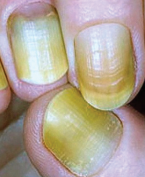By Ted Rosen, MD, FAAD, Editor-in-chief
Oral Clarithromycin for Yellow Nail Syndrome

Yellow nail syndrome (YNS) is an uncommon disorder consisting of the classic triad: yellow, thickened and slow growing nails, as well as lymphedema and chronic pulmonary disease (most often pleural effusion and bronchiectasis).
Nails grow only 0.2mm weekly compared with the typical 0.5mm to 1.2mm weekly. Only about half of YNS patients demonstrate all three manifestations.
While not definitively proven, YNS is believed to be due to congenital abnormality of the lymphatic system associated with protein leakage and microscopic vasculopathy. There exists no consensus on how to manage this disorder. Oral or topical vitamin E, oral or topical antifungals, oral zinc, and topical corticosteroid application have all been suggested previously. In my experience, none of these have been entirely successful.
A trial of long-term oral clarithromycin administration is warranted (250mg twice daily). Although nail and pulmonary improvement may be apparent in as little as one month, it may require six or more months to reach maximal benefit.
This strategy is based on the antibacterial efficacy of clarithromycin in respiratory tract infection, as well as the inherent anti-inflammatory properties of the drug. This modality has been the subject of prior publication.1 In general, macrolides such as clarithromycin are well known to decrease production and/or secretion of proinflammatory cytokines from epithelial cells, lymphocytes, monocytes, and macrophages.2 It has also been suggested that macrolides suppress the elaboration of lymphocyte-derived anti-lymphangiogenic growth factors, thereby promoting increased lymphangiogenesis.
The most common adverse events associated with clarithromycin ingestion include stomach pain, nausea, vomiting, and diarrhea.
Reference
- Matsubayashi S, et al. Effectiveness of clarithromycin in patients with yellow nail syndrome. BMC Pulm Med. 2018 Aug 15;18(1):138. doi: 10.1186/s12890-018-0707-4.
- Ianaro A, et al. Anti-inflammatory activity of macrolide antibiotics. J Pharmacol Exp Ther. 2000;292(1):156-163.


